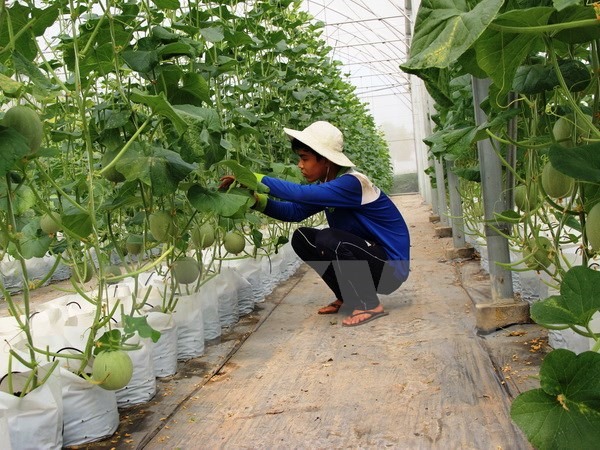Tây Ninh works towards organic farming
 |
| Melons are grown in a greenhouse in the southern province of Tây Ninh. - VNA/VNS Photo Lê Đức Hoảnh |
Located in the southern key economic zone, the proivnce has devoted more than 65 per cent of its total 270,000ha of land to agricultural production.
Other advantages for agricultural development in the province include soil suited to many types of crops and the largest irrigation system in the country, Dầu Tiếng, which can supply water to 47,000ha of farmland.
As for its potential for agricultural production, the province has sent its request to the Prime Minister and Ministry of Agriculture and Rural Development to be the first in the country to pilot the national organic agricultural development project for the 2018-2025 term.
The PM has urged the ministry to complete the project’s plan which includes guidelines for organic farming adaptation, and incentives and support measures for agricultural producers.
In the meantime, Tây Ninh has launched its own agricultural development plan which involves the use of technology in agricultural restructuring. It plans to set up clean agricultural production zones and offer incentives to attract big investors to clean and organic farming projects.
Some of the projects include a vegetable and fruit processing plant with a capacity of 500 tonnes per day, which will be put into operation by the end of 2018.
The province has also approved a list of agricultural projects that that need investment from 2017-2020.
Some of the projects include fruit and vegetable processing applying the Hazard Analysis and Critical Control Point management system. With this system, food safety is addressed via analysis and control of biological, chemical, and physical hazards, from raw material production, procurement and handling, to manufacturing, distribution and consumption of the finished product.
Chili pepper salt - a Tây Ninh specialty – will be included in brand building.
Investors in these projects must ensure sufficient planting area of fruit and vegetables of at least 10ha and the use of Good Agricultural Practices (VietGAP).
The province has also prioritised calling for investment in construction of livestock and poultry slaughterhouses and production of frozen meat products in Châu Thành, Gò Dầu and Trảng Bàng districts.
Võ Đức Trong, director of the province’s department of agriculture and rural development, said the restructuring of the province’s agricultural sector must start from the market, meaning that the province would now produce products based on market demand.
At the same time, it has to switch from low-yield crops to more competitive higher-yield and higher-value crops to export to foreign markets, he said.
The province has expanded large-scale production of high value-added crops, including pomelo, passion fruit, pineapple, and custard apple which can be used as inputs for processed products for exports.
It has learned lessons from Taiwan, Thailand and Brazil and taught local farmers how to increase production capacity and competitiveness.
According to chairman of the provincial People’s Committee, Phạm Văn Tân, this will not only result in high-quality products with more economic value but will also help farmers increase their income.
To expand organic agriculture, Tân said that the Government, ministries and agencies must adopt regulations and policies on prioritising clean agricultural production, special policies for clean farm product processing, and support measures for farmers and agricultural firms in studying new production models, marketing and branding.
He said the ministry should also help local governments invite international experts and provide assistance to large organic producers in clean farming techniques training, expertise and experience sharing, and calls for investment.
The ministry should also create a complete set of standards for producing, processing, assessing and monitoring organic products and disseminating information about organic agriculture to farmers so they can adopt good farming techniques, he added.
Thirty-three of the 63 provinces and cities in Việt Nam have developed organic farming models, but their scale is still small, about 76,000 ha in total.
Several agricultural firms have said that organic farming had brought them more challenges than successes. They cited several reasons, including strict standards for organic production; amount of time and money spent on land renovation; and lengthy and costly procedures in obtaining organic farming certificates.
What the stars mean:
★ Poor ★ ★ Promising ★★★ Good ★★★★ Very good ★★★★★ Exceptional
Latest News
More News
- Congratulations from VFF Central Committee's int’l partners to 14th National Party Congress (January 25, 2026 | 09:46)
- List of newly-elected members of 14th Political Bureau announced (January 23, 2026 | 16:27)
- 14th Party Central Committee unanimously elects To Lam as General Secretary (January 23, 2026 | 16:22)
- List of members of 14th Party Central Committee announced (January 23, 2026 | 09:12)
- Highlights of fourth working day of 14th National Party Congress (January 23, 2026 | 09:06)
- Press provides timely, accurate coverage of 14th National Party Congress (January 22, 2026 | 09:49)
- Press release on second working day of 14th National Party Congress (January 22, 2026 | 09:19)
- Minister sets out key directions to promote intrinsic strength of Vietnamese culture (January 22, 2026 | 09:16)
- 14th National Party Congress: Renewed momentum for OVs to contribute to homeland (January 21, 2026 | 09:49)
- Party Congress building momentum for a new era of national growth (January 20, 2026 | 15:00)
















 Mobile Version
Mobile Version